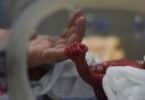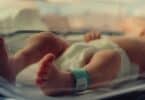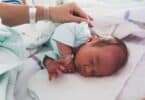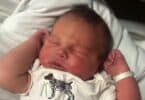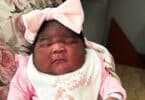In a remarkable event that underscores both the dangers and the resilience of human migration, a baby boy was born aboard a crowded inflatable dinghy carrying migrants from Africa to the Canary Islands. The birth was confirmed by Spanish coast guards, who have since released a photograph of the newborn rescued alongside his mother and scores of other migrants.
The overcrowded raft was first spotted on January 6, off the coast of Lanzarote, one of Spain’s Canary Islands. It is believed that rescuers reached the vessel mere moments after the baby was born, marking the day of the Epiphany—a Christian holiday that celebrates the arrival of the Magi and is traditionally a time for gift-giving among children.
Captain Domingo Trujillo, who led the rescue mission, recounted the extraordinary scene. “We knew there was a pregnant woman on board,” he said, “but we were shocked to find a completely naked baby who appeared to have been born just 10, 15, or 20 minutes earlier.” The mother, exhausted and lying on the floor of the packed dinghy, had entrusted her newborn to another passenger for safekeeping.
Medical personnel onboard the rescue vessel assessed the situation and decided to airlift both mother and baby to a hospital in Lanzarote for immediate care. Fortunately, no complications have been reported by authorities.
“It being Three Kings Day, this was the best gift we could have received,” said Álvaro Serrano Pérez, the commander of the helicopter that transported the pair. His words echoed the poignant symbolism of the event, unfolding on a day that commemorates the arrival of gifts to the infant Jesus.
The ocean crossing from Africa to the Canary Islands is notoriously dangerous. Last year, over 46,800 undocumented migrants embarked on this treacherous route, according to Spanish government data. Many vessels are overcrowded, ill-equipped, and unfit for the open sea, leading to countless tragedies each year.
Despite the dangers, stories like this one highlight the determination of those who undertake these journeys. For many, the Canary Islands represent the first step toward a better life in Europe. However, the physical and emotional toll of such crossings is immense, with women, children, and newborns among the most vulnerable.
This is not the first time a baby has been born under such circumstances. In recent years, there have been multiple reports of births aboard migrant boats. In November 2022, a baby girl was born on a rescue vessel operated by the NGO SOS Méditerranée, after her mother was rescued from a small wooden boat in the central Mediterranean. Similarly, in May 2021, a baby boy was born aboard an overcrowded fishing boat carrying migrants from Libya to Italy.
For the mother and baby rescued on January 6, their journey is far from over. While the immediate danger has passed, their future remains uncertain. Like thousands of others who arrive in the Canary Islands each year, they will face the complexities of asylum processes and the challenges of starting anew in an unfamiliar land.



